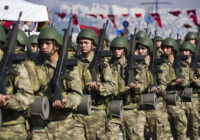Tunisia’s young voters play a vital role in the country’s first free and fair election.
For many years the results of the presidential elections in Tunisia were known even before the elections had actually taken place. Not this time. Three years after the small North African country sent its autocratic leader Zine El Abidine Ben Ali into exile, it is holding the first free and fair presidential elections in its history. The outcome could not be more suspense-packed.
When the so-called Arab Spring started in Tunisia in late 2010, no one was able to predict which path the country would take in the aftermath of the uprising. Now, three years later, Tunisia is about to finalize its democratic transition with an election of what will be Tunisia’s president for the coming five years. As a matter of fact, the democratization process has not been an easy one, nevertheless the country has taken a number of one big steps toward becoming a full-fledged democracy. Not only has it adopted the most progressive constitution of the region earlier this year, it has also set up a commission to ensure for transitional justice matters to be addressed. The presidential elections today, together with the legislative elections held one month ago, are just the icing on the cake.
More Than One Way to Make Politics
However, this democratic transition would not have been possible without Tunisia’s youth. Often marginalized and still somehow excluded from the formal political process, it has nevertheless ensured that the country will not derail on its way to democracy. But instead of campaigning within traditional political parties, the youth has opted for other means to make its voice heard. From cyber activism to political rap, Tunisia’s young people prove that there is more than one way to make politics. Yet, its most important function has become that of a watchdog, monitoring every step Tunisia’s political elite is now taking.
Mourakiboun, an election observation association led by young Tunisians, has dispatched over 5000 observers throughout the country to make sure the elections take place in fair conditions. In the meantime 30-year-old Amira Yahiaoui, co-founder and president of the NGO Al Bawsala, has just been honored with the prize of the Jacques Chirac Foundation for her contribution to Tunisia’s democratic transition. Her organization has been live-tweeting the entire constitutional debates since 2012, making them accessible to the larger public and thus enhancing political transparency. A great number of similar youth-initiated projects have emerged in the post-revolution period in Tunisia, showing the youth’s commitment to take up an active part in the country’s political process.
Considering these conditions, it was would seem unsurprising if the youth would once again be absent from the polling stations today. However, the past few days have witnessed a sudden change of dynamic in the electoral run-up.
After long years of heavy repression against any form of political activism, the youth has indeed decided to make effective use of its newly gained freedom of expression. And it is not willing to give up on this freedom ever again. However, no political party seems to have been able to win the youth’s favor. Failing to address their most pressing issues and offer pragmatic solutions to youth unemployment and social exclusion, the parties did not live up to the young people’s expectations.
In addition, the never-ending struggles between Islamists and secularists might have put them off to cast their votes. As a consequence, the young were largely absent from the ballot boxes one month ago.
Hardly the Right Message
What then does this mean for the presidential elections? With Nidaa Tounes sending their party leader, 87-year old Beji Caid Essebsi as candidate into the presidential elections, the party has hardly sent out the right message to those below the age of 30 desperately hoping for a leader who will bring more stability into their young lives. As for Ennahda, it has decided not to let any of its own members run, although the current office-holder – interim president Moncef Marzouki –has been widely declared as the Islamist party’s unofficial candidate.
Other candidates include Slim Riahi, wealthy businessman and president of a football club. Whether he will be able to gain a necessary majority is questionable, as his supporters will likely only include the fans of his club. As for Kalthoum Kannou, the sole woman in the race, she might not be able to rally enough voices either, although campaigns in her favor were launched on social media.
Considering these conditions, it was would seem unsurprising if the youth would once again be absent from the polling stations today. However, the past few days have witnessed a sudden change of dynamic in the electoral run-up. Hamma Hammami, leader of the Popular Front and outspoken communist, was able to mobilize large crowds in what looked like a last minute shot before the opening of the polling stations. Profile pictures with a red wave, symbol of Hammami’s political campaign, have since invaded social media, and surprisingly many youth activists and artists have joined the supporters of Hammami, lending their voice to the weld eshaab – the son of the people, as he is now called with reference to his campaign slogan.
Political Ideology Is Secondary
Have Tunisia’s young people all become communists overnight? The answer is no. Political ideology has become of secondary importance here. This development must rather be explained by the fact that the youth has recognized the urgent need for an alternative in the midst of two polarizing forces. Essebsi – the “dinosaur” who served both under Tunisia’s first president, Habib Bourguiba, and the ousted Ben Ali – with his party full of former regime-members, and Ennahda, with its conservative political program, do not represent the youth’s aspirations for the future of their country.
But no matter who will be elected as the next Tunisian president, the country’s youth, with its tireless democratic engagement, will ensure that he or she plays by the rules of the game. And this is why Tunisia has already won the democratic bet.
While Nidaa is perceived to be a threat to the revolution as it might bring back Ben Ali’s old regime, Ennahda is seen as the mouthpiece of more radical Islamist groups that could make Tunisia vulnerable to terrorist threats. Hence, Tunisia’s under-30s seek a counter-balance to these two forces. And this might have well played into the hands of Hamma Hammami, as he has come to incorporate the “third way,” a potential balancing power to the ever-dominant forces of Ennahda and Nidaa.
In addition Hammami seems to have understood what others have failed to recognize: the importance to speak to the youth. Hence, only days before the elections, Hammami organized a meeting in the famous el Hamra theater in downtown Tunis where he met with young artists and activists to speak about what is at stake in today’s election. While this meeting was more of symbolic nature, it might nevertheless have sent out the right signal to Tunisia’s youth, perhaps convincing those people who would otherwise have stayed home to cast their votes today.
Hammami has become a serious alternative to both Essebsi and Marzouki, seen so far as the most likely winners in today’s elections. Whether this last minute mobilization will be sufficient to gain enough votes to get into the second round is difficult to predict.
But no matter who will be elected as the next Tunisian president, the country’s youth, with its tireless democratic engagement, will ensure that he or she plays by the rules of the game. And this is why Tunisia has already won the democratic bet.
The views expressed in this article are the author’s own and do not necessarily reflect Fair Observer’s editorial policy.
Support Fair Observer
We rely on your support for our independence, diversity and quality.
For more than 10 years, Fair Observer has been free, fair and independent. No billionaire owns us, no advertisers control us. We are a reader-supported nonprofit. Unlike many other publications, we keep our content free for readers regardless of where they live or whether they can afford to pay. We have no paywalls and no ads.
In the post-truth era of fake news, echo chambers and filter bubbles, we publish a plurality of perspectives from around the world. Anyone can publish with us, but everyone goes through a rigorous editorial process. So, you get fact-checked, well-reasoned content instead of noise.
We publish 2,500+ voices from 90+ countries. We also conduct education and training programs
on subjects ranging from digital media and journalism to writing and critical thinking. This
doesn’t come cheap. Servers, editors, trainers and web developers cost
money.
Please consider supporting us on a regular basis as a recurring donor or a
sustaining member.
Will you support FO’s journalism?
We rely on your support for our independence, diversity and quality.







Comment